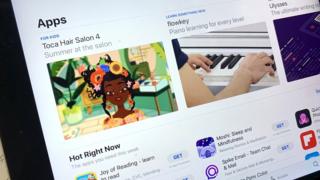Apple digs in over its App Store fees

Apple has defended the fees it charges developers to sell their digital products via its App Store.
The iPhone-maker says a study it commissioned shows content makers give away a similar cut to dozens of other online markets, and an even bigger share if their goods are sold offline.
Apple is facing complaints about the matter on both sides of the Atlantic.
The EU launched a competition probe in June, and chief executive Tim Cook will give testimony to Congress on Monday.
He will appear before the House Judiciary Antitrust Subcommittee alongside counterparts from Amazon, Facebook and Google. The tech giants all face claims that they have abused their market-leading positions.
It has emerged that ahead of the hearing, Microsoft’s president briefed the panel that his firm had concerns about the way Apple operated the App Store.
According to a report in the Information, Brad Smith has drawn attention to issues including::
- apps cannot easily be installed onto iOS devices by other means
- moderators’ decisions about whether to approve or reject apps sometimes seem arbitrary
- developers must share a cut of in-app fees, and cannot promote alternative ways to pay within their products
Public row
The is the second time in two months that Apple has published a report from the Analysis Group about its digital store.
In June, the Boston-based consultancy suggested that the App Store had “facilitated half a trillion dollars” of trade in 2019.
But that report was quickly overshadowed by the European Commission’s announcement that it was investigating complaints from the music streaming service Spotify and e-book store Kobo. They alleged that Apple’s rules gave its own digital products an unfair advantage.
To compound matters, Apple also got involved in a public spat with the makers of email app Hey, who were refusing to give it a share of their subscription fees.
Apple subsequently announced changes to its apps review process as a concession. But the latest report indicates it is not willing to compromise over the charges it imposes.
The Analysis Group compared Apple’s App Store to 37 other digital and e-commerce marketplaces.
It found the firm’s standard demand of a 30% cut of sales was in line with what Microsoft, Google, Amazon and Samsung took.
But there were some exceptions. The group said:
- Epic Games video games marketplace takes a 12% share
- Freelance work platforms including TaskRabbit and Upwork take between 5% and 20%
- Amazon Prime Video takes a 50% share of purchase and rental sales
- Kobo’s audio book platform takes a 55% to 68% cut
- Chinese app stores often charge 50% or more
The study also suggested that developers and publishers got a smaller share from offline “bricks-and-mortar” channels, where stores and other intermediaries typically take:
- a 55% share of video games sales
- a 50% share of newspaper sales
- a 60% share of magazine sales
Image copyright
Getty Images
The leaders of Facebook, Google, Apple and Amazon will all give testimony to a US anti-trust hearing next week
The report also highlighted that other e-commerce marketplaces also had rules to prohibit sellers from directing buyers to pay offsite in order to avoid fees. Examples given are:
- eBay
- Etsy
- Walmart
- Amazon
- Airbnb
However, when pressed on this last point, one of the report’s authors conceded that while shoppers were aware they could always go elsewhere to buy physical goods, they did not always realise they could buy subscriptions and other digital products outside an app.
Developers often offer cheaper deals on their own sites as they do not have to split the charge with Apple, but the tech firm forbids them from alerting users to the possibility via a link or other “call to action” within their own apps.
The Analysis Group said it believed most users would be aware it was possible to subscribe to Netflix and the bigger brands via a smart TV or website, but acknowledged this was not the case for smaller publishers.
Apple is under fire – from developers big and small, from politicians and from regulators – over the way it runs its App Store.
The firm has indicated this report doesn’t necessarily represent the testimony Mr Cook will offer when quizzed by the US Congress next week.
But if he does rebut claims of unfair practices with “we’re no worse and sometimes better than Amazon, Google, Uber and Microsoft”, he may not win over the politicians.
That argument certainly won’t impress developers like Basecamp’s David Heinemeier Hansson, who fell out badly with Apple over his email app Hey.
Although that dispute was settled, Mr Hansson still wants radical change.
“The power of Apple and the rest of the big tech monopolies is insufferable,” he told me, making it clear he was working with regulators and politicians to change things.
“That’s where permanent relief is going to come from.”
Apple can expect a long battle, but we’ve begun to see the shape of its defence.
